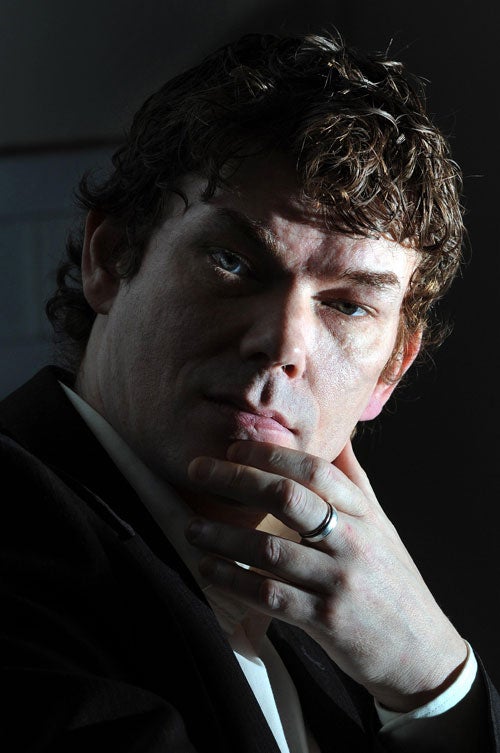Gary McKinnon: 'They can't return me to a place I wasn't in'
The British hacker gives an exclusive interview by email about his fight against extradition to the US

Your support helps us to tell the story
From reproductive rights to climate change to Big Tech, The Independent is on the ground when the story is developing. Whether it's investigating the financials of Elon Musk's pro-Trump PAC or producing our latest documentary, 'The A Word', which shines a light on the American women fighting for reproductive rights, we know how important it is to parse out the facts from the messaging.
At such a critical moment in US history, we need reporters on the ground. Your donation allows us to keep sending journalists to speak to both sides of the story.
The Independent is trusted by Americans across the entire political spectrum. And unlike many other quality news outlets, we choose not to lock Americans out of our reporting and analysis with paywalls. We believe quality journalism should be available to everyone, paid for by those who can afford it.
Your support makes all the difference.Accused of "the biggest military hack of all time", Gary McKinnon could be the most dangerous hacker in the world. Facing charges of hacking into 97 US military and Nasa computers and banned from using the internet in 2005, the 44-year-old will never touch a computer again if the US military has its way.
In less than two weeks a judicial review will consider whether McKinnon, who has Asperger's syndrome, is too unwell to cope with the trial and possible imprisonment. His lawyers are lobbying Theresa May, the new Home Secretary, asking her to save him from extradition.
Here, in his own words via email – with the help of his mother, Janis Sharp – McKinnon gives IoS readers an insight into how he feels after a four-year legal battle to stay out of the hands of the US authorities.
How are you feeling about the upcoming judicial review?
Nervous. Especially as the judge has been changed from Justice Mitting who sounded like a fair man, to two other judges, one of whom previously worked for the Treasury.
How do you spend your time?
In a state of constant stress. It's impossible to be motivated or to plan anything. Constantly wishing I could get out of my own skin.
What concerns you most?
Being alone in another country with a different culture and no family or friends near you or able to visit you is a terrifying prospect. Being dragged from my own home and country to a place I've never been in is terrifying in itself and is against the rules of our Magna Carta, which states that British citizens have a right to be tried by a jury of their peers. My peers are in the UK and this is where I should be tried. Look up the extreme conditions in those prisons and at what the ACLU (American Civil Liberties Union) say about those prisons and tell me that you wouldn't be terrified.
What do you want to say to the judges deciding your case?
Cyberspace doesn't exist any more than never-never land. I was no more in America than anyone who is on a long-distance telephone call. The fiction of cyberspace should be properly tested in a British court because it is no more real than Santa Claus. They cannot "return" me to a country I wasn't in, yet they continually refer in court to "returning me". If I was being returned to the place where my crime was committed, I would be returned to Crouch End. I am not a fugitive, I was physically in North London and have remained in North London.
Don't you think you should be punished for what you did?
I have been punished much more than I would have been had I committed a heinous crime. It's impossible to explain what eight years of heightened, constant stress does to you. I have lost eight years of my life and my parents have lost eight years of their lives. We live with this 24 hours a day and can barely think of anything else and it's impossible to plan anything or to feel happy when you know what might lie ahead.
So, what punishment would be appropriate?
A punishment proportionate to the crime and consistent with other accused hackers in the UK, including those accused of hacking into the Pentagon. As Robert Gates from the Pentagon said: 300 people a day still infiltrate Nasa and US military computers. There have been no other extradition requests from the US for any other hackers in the world, including a Romanian hacker who hacked into the Pentagon and was sentenced to eight months in Romania, and an Israeli hacker who hacked into the Pentagon and was not even given a sentence and no extradition request.
What were you looking for at Nasa?
Suppressed evidence of reverse engineered UFO technology, free energy that would help to stop climate change and would help to stop old age pensioners from dying of cold... and also evidence of anti-gravity.
What did you find?
A space fleet and an impressive UFO and a total lack of Nasa and military internet security, which I found truly shocking which is why I alerted them via cyber notes.
How do you feel about the internet now?
I was arrested in March 2002 and was allowed to remain on the internet until June 2005, which shows that my presence on the internet was not considered any risk whatsoever. Only after the US requested my extradition several years later once the UK was using the one-sided extradition treaty where no evidence was required to extradite any UK citizen was I told not to use the internet.